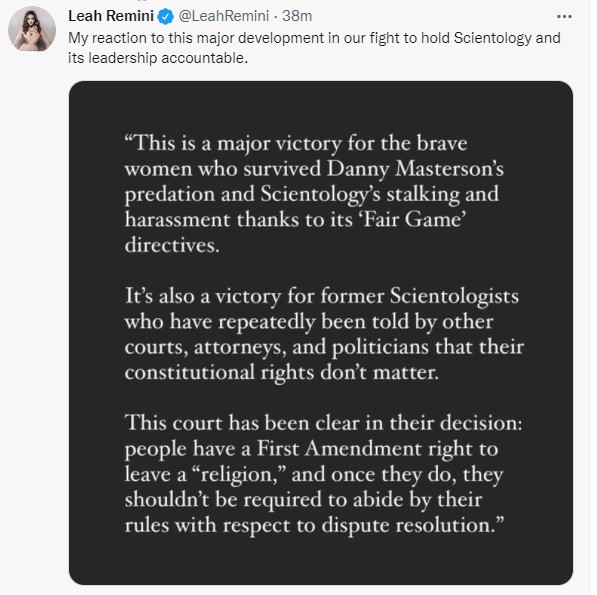
In a 39-page ruling, a California appeals court struck down a lower court’s decision that had derailed the lawsuit filed by Danny Masterson’s rape accusers against the That ’70s Show actor and against the Church of Scientology and its leader, David Miscavige.
Filed in 2019, the lawsuit is not directed at Masterson over the rape allegations that have him facing 45 years to life in a parallel criminal case, but instead was aimed at Masterson and Scientology over the years of harassment the plaintiffs say they have gone through after coming forward with their allegations to the LAPD in 2016.
Scientology had successfully derailed the suit by arguing that four of the five plaintiffs, who were former Scientology church members, had signed service contracts that obligated them to take any grievance to Scientology’s internal “religious arbitration” rather than to a court of law. Los Angeles Superior Court Judge Steven Kleifield agreed with that argument and granted Scientology’s motion, forcing the lawsuit into arbitration on December 30, 2020.
The plaintiffs — Chrissie Carnell-Bixler, her husband rocker Cedric Bixler-Zavala, and two women going by the names Jane Doe 1 and Jane Doe 2 — asked the appeals court to intervene, but their petition was denied. (A fifth plaintiff, Bobette Riales, was never a Scientologist so her part of the lawsuit was on hold.) They then sent a petition to the California State Supreme Court, which granted review. The same appeals court that had denied their petition the first time held a hearing last November that we watched live here at the Underground Bunker.
Today, that three-justice panel issued its ruling, overturning Kleifield’s order and remanding the case back to his court. And from the outset they made it clear that it was the religious freedom argument that they heard from the plaintiffs’ attorney, Marci Hamilton, that swayed them.
Years after leaving Scientology, the court says, these former members of the church should not be forced into a religious contract they had signed years earlier.
Individuals have a First Amendment right to leave a religion. We hold that once petitioners had terminated their affiliation with the Church, they were not bound to its dispute resolution procedures to resolve the claims at issue here, which are based on alleged tortious conduct occurring after their separation from the Church and do not implicate resolution of ecclesiastical issues. We issue a writ directing the trial court to vacate its order compelling arbitration and instead to deny the motion.
Wow.
We just received this ruling, and we’re going to pull out more paragraphs to look at and will post them here. We know you have a lot of questions. Will this help Valerie Haney, whose case was similarly derailed? Will this affect the Garcia case, which was upheld in a federal appeals court?
We don’t know. But we do know that this is the first defeat Scientology’s arbitration gambit has received in court after a winning streak going back about six years.
David Miscavige cannot be happy.
OK, so the ruling. First, it goes over the complex background that we summarized above. And it goes over the allegations, noting that Scientology denies that any of this is true…
According to plaintiffs, Scientology forbids members from contacting police to report a crime committed by a member. It instructs members that reporting such incidents is considered a “high crime” and subjects the reporting member to punishment. Scientology utilizes so-called “Fair Game” tactics to “attack, harass, embarrass, humiliate, destroy, and/or injure individuals who Defendants declare to be an enemy of Scientology, known in Scientology as a ‘Suppressive Person’ . . . .” Masterson is a television actor; Scientology granted him special treatment when he achieved “celebrity status.” To that end, Scientology worked to prevent plaintiffs from reporting Masterson’s crimes and, once they did, declared plaintiffs Suppressive Persons. Scientology then mobilized an aggressive Fair Game campaign against them.
While the Fair Game campaigns against each plaintiff differed, collectively plaintiffs allege Scientology’s agents committed the following acts against them: surveilled them, hacked their security systems, filmed them, chased them, hacked their email, killed (and attempted to kill) their pets, tapped their phones, incited others to harass them, threatened to kill them, broke their locks, broke into their cars, ran them off the road, posted fake ads purporting to be from them soliciting anal sex from strangers, broke their windows, set the outside of their home on fire, went through their trash, and poisoned trees in their yards. This conduct was alleged to be pursuant to Scientology’s policies and procedures. According to plaintiffs’ complaint, Scientology’s directives are that Suppressive Persons are to be silenced by whatever means necessary. Scientology instructs members “to damage the person’s professional reputation, file frivolous lawsuits, and harass and surveil ‘the enemy.’ ” Scientology’s “policies and procedures encourage and/or instruct followers to ‘ruin [the individual] utterly.’ ”
The court then notes the important distinction that the plaintiffs say this was going on after they had left the Church of Scientology. (Quite a few years after leaving, in fact.)
And, while the lawsuit is not specifically about the rape allegations, it is related to them.
While petitioners have clearly represented they are not seeking to recover from Scientology for the sexual assaults themselves, the allegations of petitioners’ complaint include allegations relating to Scientology’s attempts to cover up the sexual assaults while petitioners were still members. These include, for example, Jane Doe #1’s allegation that, when she reported that Masterson had raped her to her Scientology ethics officer, he required her to do an ethics program which pressured her into confessing the “evil purposes” she had toward Masterson and Scientology. Jane Doe #1 alleged that, while she was still a member, she was given a formal censure within the church, called a “non-enturbulation order.” Similarly, Bixler alleged that, while she was still a member, Scientology forced her to sign a document stating she would never speak publicly about her relationship with Masterson or sue him for any reason.
In addition to events occurring while still a Scientology member, each petitioner alleged an invasive Fair Game campaign occurring entirely after she had left the church.
The ruling then goes into the language of the Scientology contracts, which made these Scientology members promise that they would take “any dispute” to religious arbitration.
They also noted Scientology’s argument, that it was not up to a civil court to decide the fairness of the contracts, since that would interfere with the church’s religious rights.
The plaintiffs, on the other hand, argued that granting Scientology’s motion would not only deny their right to a trial, but it would subject them to a religious ritual in a church they no longer belonged to.
Petitioners jointly opposed all of Scientology’s motions to compel. Among a number of grounds for opposition, they argued that the dispute resolution procedure Scientology was attempting to compel was not an arbitration at all, but a religious ritual – a “form of religious punishment for nonbelievers who did not follow church doctrine.”17 This encompassed two subsidiary arguments. First, petitioners argued it was unconstitutional to force them to participate in such a ritual, as they have exercised their constitutional right to change religions. Petitioners supported their motion with declarations stating that the campaign of harassment occurred after they left the church. Second, they argued they would be unable to receive a fair adjudication because, as they had been declared Suppressive Persons, any arbitration panel comprised of “Scientologists in good standing” would be required, by the Fair Game doctrine, to rule against them, or risk being declared Suppressive Persons themselves.
And they detailed Scientology’s reply:
In reply, Scientology took the position that its dispute resolution proceedings were not religious rituals. Scientology argued that its dispute resolution procedures were to be governed by Scientology law, claiming, the “[a]greement to be bound by Scientology law, including Scientology dispute resolution procedures and arbitration, is a condition for acceptance into Scientology religion.” The Church argued, “Plaintiffs ask this Court to adopt a radical position never embraced by any court in the United States: Agreements to submit disputes to religious arbitration are null and void when one of the signatories later decides to leave the religion. The entire thrust of the Opposition is that an apostate – a person who has left a religion – may not be ‘forced’ to participate in religious arbitration for fear of violating the First Amendment. This argument runs counter to every principle of contract law and arbitration law, and itself creates an impermissible and unconstitutional separate standard for adjudicating agreements entered into by churches.”
The Church represented that petitioners had not, in fact, been declared Suppressive Persons, but argued that, in any event, this was a “dispute over orthodoxy” which should be “litigated ‘exclusively’ in an ecclesiastical setting. This court may not adjudicate what is and is not Scientology doctrine, or whether Plaintiffs have been ‘declared’ by the Church under its doctrine, but that is what Plaintiffs seek.”
As part of its Reply, Scientology submitted an additional declaration of Lynn Farny. Farny declared that “Fair Game” is not a Church doctrine and that, in fact, “[i]n the authorized published works of the Church, comprising some 70 million printed and spoken words, the phrase ‘Fair Game’ never appears.” Plaintiffs had relied on a 1967 Scientology document indicating that the penalty for an “ENEMY” was “SP Order. Fair game. May be deprived of property or injured by any means by any Scientologist without any discipline of the Scientologist. May be tricked, sued or lied to or destroyed.” Farny represented that this document was canceled in 1968, and is no longer Church doctrine.
The hearing was held on November 6, 2020.
Scientology argued that the agreement to arbitrate survived termination of the agreement itself, stating, “this is a pledge for as long as you might have claims against the Church
to arbitrate your issues against the Church.” In response, petitioners again argued that the contemplated procedure was a religious ritual, and they had a First Amendment right to leave the Church and no longer be compelled to participate in that ritual.
The court then asked for additional briefing, and in December, they say, the plaintiffs for the first time said it outright: None of the harassment had occurred until after they had left the church.
Petitioners’ December 9, 2020 opposition brief took the position – for the first time in unequivocal language – that the causes of action did not, in fact, rely on conduct arising before they left the Church: “All claims alleged by Plaintiffs occurred after Plaintiffs left Scientology and therefore do not arise from the agreements which covered Plaintiffs’ religious services when they were members.”
And that, the court says, is what makes the difference. Yes, Scientology should be able to enforce its contracts. But these are allegations that arose after these members left the church.
This case involves both petitioners’ First Amendment rights to leave a faith and Scientology’s right to resolve disputes with its members without court intervention. When applied to a dispute that arose after petitioners left the faith, and which can be resolved on neutral principles of tort law, we find petitioners’ right to leave the faith must control.
And in a footnote, they point out how this differentiates the case from the situation with the Garcias.
While we find Garcia relevant to Scientology’s constitutional argument, and discuss it in that context, we recognize that the Garcias had sought the return of funds donated while they were members. The case therefore did not consider whether former members could be compelled to arbitrate claims arising from torts committed after they had left the church.
Also, they point out that they were not swayed by the argument that Scientology’s arbitration is a “religious ritual.” The issue is whether it can be enforced for activity that occurred after the member left the church.
We pause to point out that, in the briefs filed both in the trial court and this court, petitioners spend considerable time on whether Scientology arbitration constitutes a religious ritual, such that compelling their participation in the ritual would violate their First Amendment rights for that reason. Whether Scientology arbitration is a ritual is immaterial to our analysis. The issue properly phrased is: after petitioners have left the faith, can Scientology still require that all of Scientology’s future conduct with respect to petitioners – including torts of whatever kind – be governed by Scientology law, with disputes to be resolved solely in Scientology tribunals by Scientology members? We conclude it cannot.
And in particular, if Scientology declares someone a suppressive person (excommunicates them), how can it then expect them to abide by its contracts?
Jane Doe #1 does not allege that she voluntarily left the Church; instead, she learned in 2005 that she had been declared a Suppressive Person and was told she was no longer permitted to engage in religious services at the Church. Having excluded Jane Doe #1 from its religious services, and allegedly committed torts against her more than 10 years later, the Church cannot now enforce against Jane Doe #1 the arbitration clause in an agreement she signed in order to obtain the religious services from which she has been excluded. If the religious relationship has been terminated – by either party – and the parishioner is no longer a member of the Church, the arbitration clause does not survive to cover disputes arising from future non-religious tortious conduct.
There’s a fair amount of analysis of case law, and then here’s the wind-up…
As we stated at the outset of this opinion, we hold that once petitioners terminated their affiliation with the Church, they were not bound to its dispute resolution procedures to resolve the claims at issue here, which are based on alleged tortious conduct occurring after their separation from the Church and do not implicate resolution of ecclesiastical issues. Scientology argues that petitioners simply agreed to be bound by Scientology dispute resolution procedures no matter what. As Scientology puts it, “An ‘irrevocable’ agreement to ‘forever’ waive civil proceedings and submit to Scientology Ethics and Justice Codes in ‘any dispute’ with Churches of Scientology is a condition for participation in the religion.” It argues that this agreement should be enforced like any other agreement. Enforcing this provision without regard to petitioners’ First Amendment rights would mean that if the Church or a Church member committed any intentional or negligent tort against a former member of the Church, that former member would be bound by Scientology dispute resolution procedures regardless of the fact that the member had left the Church years, even decades, before the tort. In effect, Scientology suggests that one of the prices of joining its religion (or obtaining a single religious service) is eternal submission to a religious forum – a sub silencio waiver of petitioners’ constitutional right to extricate themselves from the faith. The Constitution forbids a price that high.
DISPOSITION
The petition is granted. Let a writ of mandate issue directing respondent court to vacate its order granting the Church’s petitions to compel arbitration and enter a new and different order denying the motions. Petitioners shall recover their costs.
And costs!
The opinion was written by presiding justice Laurence Rubin. Justice Moor concurs, and Justice Baker also joined the decision, but registered a difference of opinion on the legal discussion.
Looking back, it struck us as a particularly bizarre moment during the November hearing. One of the justices had asked Scientology’s attorney, William Forman: If someone took a Scientology course and signed a service contract, and then 20 years later was run over on the street by a Scientology van, would they be obliged to take that dispute to religious arbitration?
YES, Forman had responded, and it sounded as ridiculous then as it does now.
Finally, common sense comes through. OF COURSE Scientology can’t force ex-members into arbitration for stalking and harassing them years after they’d sign arbitration agreements. Of course.
We asked for a comment from Mike Rinder:
Of course I am very happy that a court has finally prevented Scientology from bulldozing plaintiffs into being Interested Parties in a Committee of Evidence — which is NOT arbitration (“That’s not an arbitration; it’s just plain arbitrary,” in the words of Justice Rosenbaum of the 11th Circuit).
Unfortunately, it appears the underlying lie in all of this — that there is no such thing as “religious arbitration” in Scientology, there is only a one-sided, pre-ordained Kangaroo Court proceeding that is inherently unfair — was avoided by focusing on the conduct of Scientology after the plaintiffs left, which the court quite rightly (and sensibly) ruled cannot be covered by a Service Enrollment Agreement.
Scientology’s legal armor just had an arm blown off. They will no doubt ask for an en banc review and if that fails petition the Supreme Court but in California at least, they are going to fail and no longer be able to enforce these agreements with respect to anything that happened after someone left Scientology. And that is a relief.
Here’s the entire document.
Bixler v. Masterson by Tony Ortega
UPDATE: OK, we want to add some more thoughts about the ruling, and how it might reflect on the other cases, Valerie Haney’s, and the Garcias, that we predicted you would be asking about.
First, although we felt compelled to give Marci Hamilton some credit because this turned out to be a decision dealing with religious rights, it’s also important to point out that the court specifically rejected her formulation of the problem.
Hamilton had tried to convince the court that the plaintiffs, since they are no longer members, should not have to go through an arbitration proceeding that is essentially a “religious ritual.”
The court very specifically rejected that argument, saying that they didn’t consider Scientology’s arbitration to be a religious ritual.
More importantly, the court said, was that the allegations of abuse occured after these plaintiffs had left the church.
And this, of course, was always the craziest element of these cases. You might remember our analogy, where we said that someone, after signing a waiver to ride a roller coaster, might be prevented from suing an amusement park that came and set their house on fire ten years later.
That’s exactly what the court is objecting to: Not that you signed the waiver, not that you promised to take a grievance to arbitration, but that years later, after leaving the organization, Scientology had harmed you but still expected that old contract to apply.
And the court pointed to the Garcia case to show how this ruling wouldn’t affect that case. Why? Because the Garcias, who filed their lawsuit in 2013, are alleging abuse that happened while they were still in the church. The Garcias sued because they say they were lied to by Scientology in order to get donations from them. The Garcias may no longer be Scientologists today, but the harm occurred while they were still inside.
Valerie Haney’s case is stickier. She’s alleging harm that occurred both while she was in the Sea Org (the kidnapping claim) and after she had left (the stalking and libel that happened while she was working for Leah Remini). We remember being surprised that she included the kidnapping claim, that seemed like a different case, and perhaps now that looks like a wrong move. Can she drop that claim and proceed only on the abuse she says she received after leaving the church? We don’t know.
Like you, we have a lot of questions at this point. But we do suspect that Scientology will appeal this ruling to the California State Supreme Court, and then to the US Supreme Court. It may be quite a while before this case is really back in Judge Kleifield’s court for its next step. Which, Scientology has already indicated, will be an anti-SLAPP motion.
In an anti-SLAPP motion, Scientology will allege that the plaintiffs are shutting down their free speech with a bogus lawsuit. As we’ve pointed out in the past, anti-SLAPP statutes were designed with big bullies like the Church of Scientology in mind, so it’s beyond ironic that Scientology would attempt to use anti-SLAPP motions to defend themselves. (And it has not gone well for them in other cases.)
Meanwhile, the criminal case is unaffected by this. The next hearing in Danny Masterson’s rape case is February 8, and his trial is still scheduled for August 29. He’s facing 45 years to life in prison if he’s convicted.

——————–
Sign up for a daily email when we post a new story on Scientology.
Did you know you can get an email every morning when we post our daily Scientology story? We know some of the folks who come to the Underground Bunker aren’t here to talk about the politics of the day, and that’s why we created a daily politics feature over at our other blog, The Lowdown, and we ask readers to take their political discussions over there. And if you drop us a line at tonyo94 AT gmail, we’ll put you on the list so you get a morning reminder that a new Scientology story has been posted — and only for our Scientology stories.
——————–
“You find many a girl — various stresses in the war you notice this: Some girl who was very much in love with some young man, and he got knocked off, something like that, and right away she becomes a lawyer — begins to talk in a rather husky voice. If you watch her a while longer, the next thing you know, she’s liable to start smoking cigars. You know? And in order to exteriorize her, you’d have to exteriorize her out of the body of a young man before you could exteriorize her out of the body she’s in. Now she doesn’t want to be in the body she’s in, so she’s not really in the body she’s in, and you just don’t have a dog’s chance of exteriorizing her out of that body. You say, ‘Be three feet back of your head.’ She’s not in it. So the whole command misses. You see that?” — L. Ron Hubbard, January 19, 1956
——————–
“1969 was the year of Out-Ethics. In 1970 I trust all SO members will wear their ethics hats. Every SO member has one. Every time we ease up or drop Ethics we get horrible problems and stats. It can be plotted on the Int GI. Fact is Ethics is madly out on the planet. Definition of some Earth wog leaders — somebody who is trying to get even with everybody else. Definition of psychiatry: the government’s method of getting even with the insane.” — The Commodore, January 19, 1970
——————–
“Imagine that you are strong enough to instantly destroy in absolute agony anyone who offers you the slightest offence. Once you have destroyed them then it is done. You cannot reverse it. Might you postulate inability in yourself after destroying a loved one who admired another’s body when they thought you were not looking? We do not trust ourselves to become OT again until we have learnt to control our destructive impulses. The latest OT rundown is not a solution. The solution is spending thousands of hours studying LRH tech and fully understanding and applying it.”
——————–
1997: The Associated Press reported that an Athens court has ordered Scientology to close its doors in Greece. “A copy of the ruling obtained by The Associated Press on Friday accused the church of operating under the cloak of a philosophic society to try to lure, brainwash and exploit members. ‘It is an organization with medical, social and ethical practices that are dangerous and harmful,’ Judge Constandia Angelaki wrote in her ruling. ‘It claims to act freely so as to draw members who subsequently undergo … brainwashing by dictated ways of thinking that limit reaction capabilities.’ Angelaki ruled on the case on Dec. 20 but the verdict was officially issued Thursday. The move followed numerous complaints from relatives of members of the church, which operated here as the Center of Applied Philosophy in Greece. They claimed the center transformed their kin into moody or suicidal automatons. ‘The case is a sham,’ Jentzsch wrote. ‘It is unfortunately reminiscent of the former junta that ruled Greece as a totalitarian state and the assault today is simply because the mission is not ‘orthodox’ according to the prevailing vested interests in Greece.'”
——————–
“OT 7 is just sitting in a room talking to yourself and seeing if the needle reacts. You’d think after a couple of years of doing that they would just say ‘fuck it!’ and tell the case supervisor ‘The belfry is bat-free’.”
——————–
Full Court Press: What we’re watching at the Underground Bunker
Criminal prosecutions:
— Danny Masterson charged for raping three women: Next hearing set for February 8. Trial scheduled for August 29.
— ‘Lafayette Ronald Hubbard’ (a/k/a Justin Craig), false imprisonment, aggravated assault, plus drug charges: Next hearing scheduled for January 18.
— Hanan and Rizza Islam and other family members, Medi-Cal fraud: Pretrial conference January 22 in Los Angeles
— David Gentile, GPB Capital, fraud: Next pretrial conference set for February 11.
— Joseph ‘Ben’ Barton, Medicare fraud: Pleaded guilty, awaiting sentencing.
— Yanti Mike Greene, Scientology private eye accused of contempt of court: Next hearing February 15.
Civil litigation:
— Luis and Rocio Garcia v. Scientology: Eleventh Circuit affirmed ruling granting Scientology’s motion for arbitration. Garcias considering next move.
— Valerie Haney v. Scientology: Forced to ‘religious arbitration.’ US Supreme Court denied Valerie’s petition Oct 4.
— Chrissie Bixler et al. v. Scientology and Danny Masterson: California Supreme Court granted review on May 26 and asked the Second Appellate Division to direct Judge Steven Kleifield to show cause why he granted Scientology’s motion for arbitration. Oral arguments held November 2, awaiting a ruling.
— Brian Statler Sr v. City of Inglewood: Third amended complaint filed, trial set for June 28.
— Author Steve Cannane defamation trial: Trial concluded, Cannane victorious, awarded court costs. Case appealed on Dec 23. Appeal hearing held Aug 23-27. Awaiting a ruling.
— Chiropractors Steve Peyroux and Brent Detelich, stem cell fraud: Lawsuit filed by the FTC and state of Georgia in August, now in discovery phase.
——————–
 THE PROSECUTION OF DANNY MASTERSON
THE PROSECUTION OF DANNY MASTERSON
We first broke the news of the LAPD’s investigation of Scientology celebrity Danny Masterson on rape allegations in 2017, and we’ve been covering the story every step of the way since then. At this page we’ve collected our most important links, including our four days in Los Angeles covering the preliminary hearing and its ruling, which has Danny facing trial and the potential sentence of 45 years to life in prison.
After the success of their double-Emmy-winning, three-season A&E series ‘Scientology and the Aftermath,’ Leah Remini and Mike Rinder continue the conversation on their podcast, ‘Scientology: Fair Game.’ We’ve created a landing page where you can hear all of the episodes so far.
 LEAH REMINI: SCIENTOLOGY AND THE AFTERMATH
LEAH REMINI: SCIENTOLOGY AND THE AFTERMATH
An episode-by-episode guide to Leah Remini’s three-season, double-Emmy winning series that changed everything for Scientology watching. Originally aired from 2016 to 2019 on the A&E network, and now on Netflix.
 SCIENTOLOGY’S CELEBRITIES, from A to Z
SCIENTOLOGY’S CELEBRITIES, from A to Z
Find your favorite Hubbardite celeb at this index page — or suggest someone to add to the list!
Other links: SCIENTOLOGY BLACK OPS: Tom Cruise and dirty tricks. Scientology’s Ideal Orgs, from one end of the planet to the other. Scientology’s sneaky front groups, spreading the good news about L. Ron Hubbard while pretending to benefit society. Scientology Lit: Books reviewed or excerpted in a weekly series. How many have you read?
——————–
THE WHOLE TRACK
[ONE year ago] Danny Masterson accusers want emergency halt on ‘religious arbitration’ to protect rape case
[TWO years ago] Georgia puts legislator who promotes Scientology anti-psych efforts on mental health panel
[THREE years ago] New Sea Org escapee says that Scientology still forcing abortions, decade after practice exposed
[FOUR years ago] More Scientology news is here: You won’t believe how fast this planet is being cleared!
[FIVE years ago] Scientology in hot water again for cutting down trees without permission
[SIX years ago] When the feds tracked down L. Ron Hubbard’s boast about getting rich by creating a religion
[SEVEN years ago] Earache my eye: A Scientology official’s excuses why he can’t fly for deposition in fraud suit
[EIGHT years ago] Sunday Funnies: For the second year in a row, Scientology will have an ad in the Super Bowl
[NINE years ago] We Told You Jamie DeWolf Would Blow Up!
[TEN years ago] Scientology Spokeswoman Who Disconnected From Her Father Criticizes Scientology Victim Who Didn’t
——————–
Bernie Headley (1952-2019) did not see his daughter Stephanie in his final 5,667 days.
Valerie Haney has not seen her mother Lynne in 2,550 days.
Katrina Reyes has not seen her mother Yelena in 3,055 days
Sylvia Wagner DeWall has not seen her brother Randy in 2,575 days.
Brian Sheen has not seen his grandson Leo in 1,595 days.
Geoff Levin has not seen his son Collin and daughter Savannah in 1,486 days.
Christie Collbran has not seen her mother Liz King in 4,793 days.
Clarissa Adams has not seen her parents Walter and Irmin Huber in 2,661 days.
Carol Nyburg has not seen her daughter Nancy in 3,435 days.
Doug Kramer has not seen his parents Linda and Norm in 1,766 days.
Jamie Sorrentini Lugli has not seen her father Irving in 4,239 days.
Quailynn McDaniel has not seen her brother Sean in 3,555 days.
Dylan Gill has not seen his father Russell in 12,121 days.
Melissa Paris has not seen her father Jean-Francois in 8,040 days.
Valeska Paris has not seen her brother Raphael in 4,208 days.
Mirriam Francis has not seen her brother Ben in 3,789 days.
Claudio and Renata Lugli have not seen their son Flavio in 4,050 days.
Sara Goldberg has not seen her daughter Ashley in 3,086 days.
Lori Hodgson has not seen her son Jeremy and daughter Jessica in 2,801 days.
Marie Bilheimer has not seen her mother June in 2,326 days.
Julian Wain has not seen his brother Joseph or mother Susan in 681 days.
Charley Updegrove has not seen his son Toby in 1,856 days.
Joe Reaiche has not seen his daughter Alanna Masterson in 6,407 days
Derek Bloch has not seen his father Darren in 3,556 days.
Cindy Plahuta has not seen her daughter Kara in 3,876 days.
Roger Weller has not seen his daughter Alyssa in 8,731 days.
Claire Headley has not seen her mother Gen in 3,850 days.
Ramana Dienes-Browning has not seen her mother Jancis in 2,206 days.
Mike Rinder has not seen his son Benjamin and daughter Taryn in 6,509 days.
Brian Sheen has not seen his daughter Spring in 2,615 days.
Skip Young has not seen his daughters Megan and Alexis in 3,013 days.
Mary Kahn has not seen her son Sammy in 2,889 days.
Lois Reisdorf has not seen her son Craig in 2,472 days.
Phil and Willie Jones have not seen their son Mike and daughter Emily in 2,967 days.
Mary Jane Barry has not seen her daughter Samantha in 3,221 days.
Kate Bornstein has not seen her daughter Jessica in 14,330 days.
——————–
 Posted by Tony Ortega on January 19, 2022 at 18:20
Posted by Tony Ortega on January 19, 2022 at 18:20
E-mail tips to tonyo94 AT gmail DOT com or follow us on Twitter. We also post updates at our Facebook author page. After every new story we send out an alert to our e-mail list and our FB page.
Our new book with Paulette Cooper, Battlefield Scientology: Exposing L. Ron Hubbard’s dangerous ‘religion’ is now on sale at Amazon in paperback and Kindle formats. Our book about Paulette, The Unbreakable Miss Lovely: How the Church of Scientology tried to destroy Paulette Cooper, is on sale at Amazon in paperback, Kindle, and audiobook versions. We’ve posted photographs of Paulette and scenes from her life at a separate location. Reader Sookie put together a complete index. More information can also be found at the book’s dedicated page.
The Best of the Underground Bunker, 1995-2021 Just starting out here? We’ve picked out the most important stories we’ve covered here at the Underground Bunker (2012-2021), The Village Voice (2008-2012), New Times Los Angeles (1999-2002) and the Phoenix New Times (1995-1999)
Other links: BLOGGING DIANETICS: Reading Scientology’s founding text cover to cover | UP THE BRIDGE: Claire Headley and Bruce Hines train us as Scientologists | GETTING OUR ETHICS IN: Jefferson Hawkins explains Scientology’s system of justice | SCIENTOLOGY MYTHBUSTING: Historian Jon Atack discusses key Scientology concepts | Shelly Miscavige, 15 years gone | The Lisa McPherson story told in real time | The Cathriona White stories | The Leah Remini ‘Knowledge Reports’ | Hear audio of a Scientology excommunication | Scientology’s little day care of horrors | Whatever happened to Steve Fishman? | Felony charges for Scientology’s drug rehab scam | Why Scientology digs bomb-proof vaults in the desert | PZ Myers reads L. Ron Hubbard’s “A History of Man” | Scientology’s Master Spies | The mystery of the richest Scientologist and his wayward sons | Scientology’s shocking mistreatment of the mentally ill | The Underground Bunker’s Official Theme Song | The Underground Bunker FAQ
Watch our short videos that explain Scientology’s controversies in three minutes or less…
Check your whale level at our dedicated page for status updates, or join us at the Underground Bunker’s Facebook discussion group for more frivolity.

Our non-Scientology stories: Robert Burnham Jr., the man who inscribed the universe | Notorious alt-right inspiration Kevin MacDonald and his theories about Jewish DNA | The selling of the “Phoenix Lights” | Astronomer Harlow Shapley‘s FBI file | Sex, spies, and local TV news | Battling Babe-Hounds: Ross Jeffries v. R. Don Steele

Tony Ortega at The Daily Beast








